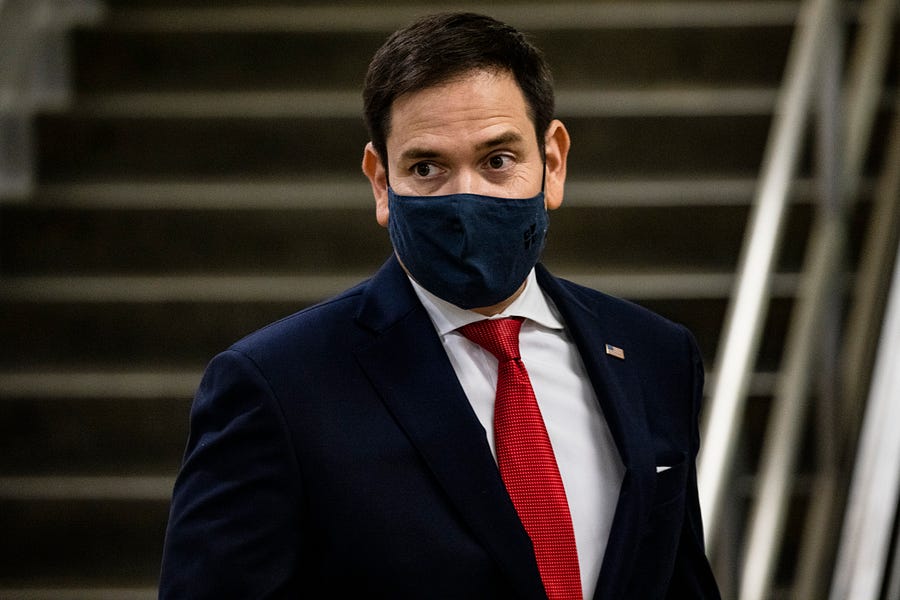One Amazon fulfillment center’s push to unionize in Bessemer, Alabama, is attracting the attention of members of the top echelon of American politics. Today, plant employee Jennifer Bates will testify before the Senate Budget Committee at the invitation of Sen. Bernie Sanders.
The workers at the Alabama plant are getting endorsements from President Joe Biden and even Republican Sen. Marco Rubio. However, the political motivations are different on each side of the aisle. A Democratic president supporting unionization is hardly a surprise, but, at face value, a GOP endorsement of the measure is. Until you realize that Rubio’s incentives are more politically based than policy-oriented.
But first, what’s actually happening in Bessemer?
With the fulfillment center employing more than 5,800 people, this is the biggest push for a union Amazon has seen from a group of employees. Voting opened in early February and will close on March 29.
If employees vote in favor of unionizing, they would join the pre-existing Retail, Wholesale and Department Store Union (RWDSU). That organization has over 100,000 members nationally in many different industries including sanitation workers, grocery store workers, and those that work in the poultry industry. Alabama is a “right to work” state, meaning employees of a union shop can’t be compelled to join a union or pay dues..
The full-time employees of the Bessemer center are offered an hourly wage of $15.30 (well above Alabama’s minimum wage) and full benefits; part-time workers are offered different benefits. However, employees have complained of a lack of communication from leadership and other issues. One employee told AL.com that there was insufficient advance warning of mandatory overtime, and if a person shows up late to said overtime, that hour or so is docked from paid time off.
“From the point of view from labor partisans, they are hopeful that if they win this will set off a chain reaction through Amazon and other distribution centers,” U.S. labor research professor at University of California-Santa Barbara Nelson Lichtenstein told The Dispatch. However, he added, “It’s been very difficult in recent years … history, frankly, is on the side of Amazon.”
Because this could cause a possible ripple effect across the country, Amazon is pulling out all the stops to prevent any union from forming. According to the Washington Post, employees complained of excess signage all over the fulfillment center and multiple emails a day discouraging joining a union. The company has even set up a website at doitwithoutdues.com to help spread their anti-union message.
Now to the politics of all of this.
President Biden posted a video to Twitter supporting the move. “Workers in Alabama—and all across America—are voting on whether to organize a union in their workplace,” he said. “This is vitally important.”
“Biden was saying ‘it’s the worker’s decision and the employers should stay out of it.’ That’s a powerful idea, and I think it’s a sort of shot across the bow for all these employers.” Lichtenstein said. He also emphasized just how influential that video was to the movement as a whole, “I do think every union organizing campaign for the next three years will pull out that Biden two-minute video.”
While the president never actually said “Amazon,” RWDSU President Stuart Appelbaum told Politico, “This is the most pro-union statement from a president in United States history. The workers understand who he was speaking to. That is a clear message and it’s been interpreted as such by workers, observers and the media.”
On the other side of the aisle, Rubio has voiced his approval as well. But Rubio has found a way to make this issue another battle in the ongoing culture wars.
As Stan Veuger, an economist with the American Enterprise Institute, puts it, “The overwhelming majority of Republican elected officials are opposed to unionization generally. They all support right-to-work laws. In this case specifically, there is one exception which is Marco Rubio, who wants to punish Amazon because they do not support the political causes that he wants them to support and so he has endorsed this particular union drive as some sort of gambit to ultimately become president.”
In a video posted to Twitter Rubio complains about decisions the company has made, such as withdrawing books by conservative authors and removing a documentary about Supreme Court Justice Clarence Thomas from its streaming service. He said, “Here’s the bottom line, it’s very simple for me. The largest, richest company in the world and a champion of wokeness that all it does is beat up on conservatives, versus hard working Americans who just want to get paid a little more, or have better work conditions. It’s an easy choice.”
Lichtenstein tells The Dispatch that Rubio’s motivations may not have been focused on the workers in Bessemer, “This is about a cultural war. With a workforce [at the Bessemer facility] that’s 85% African American they aren’t objecting to the ‘woke’ character of Jeff Bezos. That’s not their problem. … Rubio was really pushing the envelope there a long way.”
As the culture wars continue to be shoved to the forefront, Veuger notes this type of messaging from Republicans is becoming more and more common. “We’ve been seeing more of this,” he said. “Whenever a company does something that is not in line with whatever religious grievances the GOP officials hold they get mad and so they try to punish them.”









Please note that we at The Dispatch hold ourselves, our work, and our commenters to a higher standard than other places on the internet. We welcome comments that foster genuine debate or discussion—including comments critical of us or our work—but responses that include ad hominem attacks on fellow Dispatch members or are intended to stoke fear and anger may be moderated.